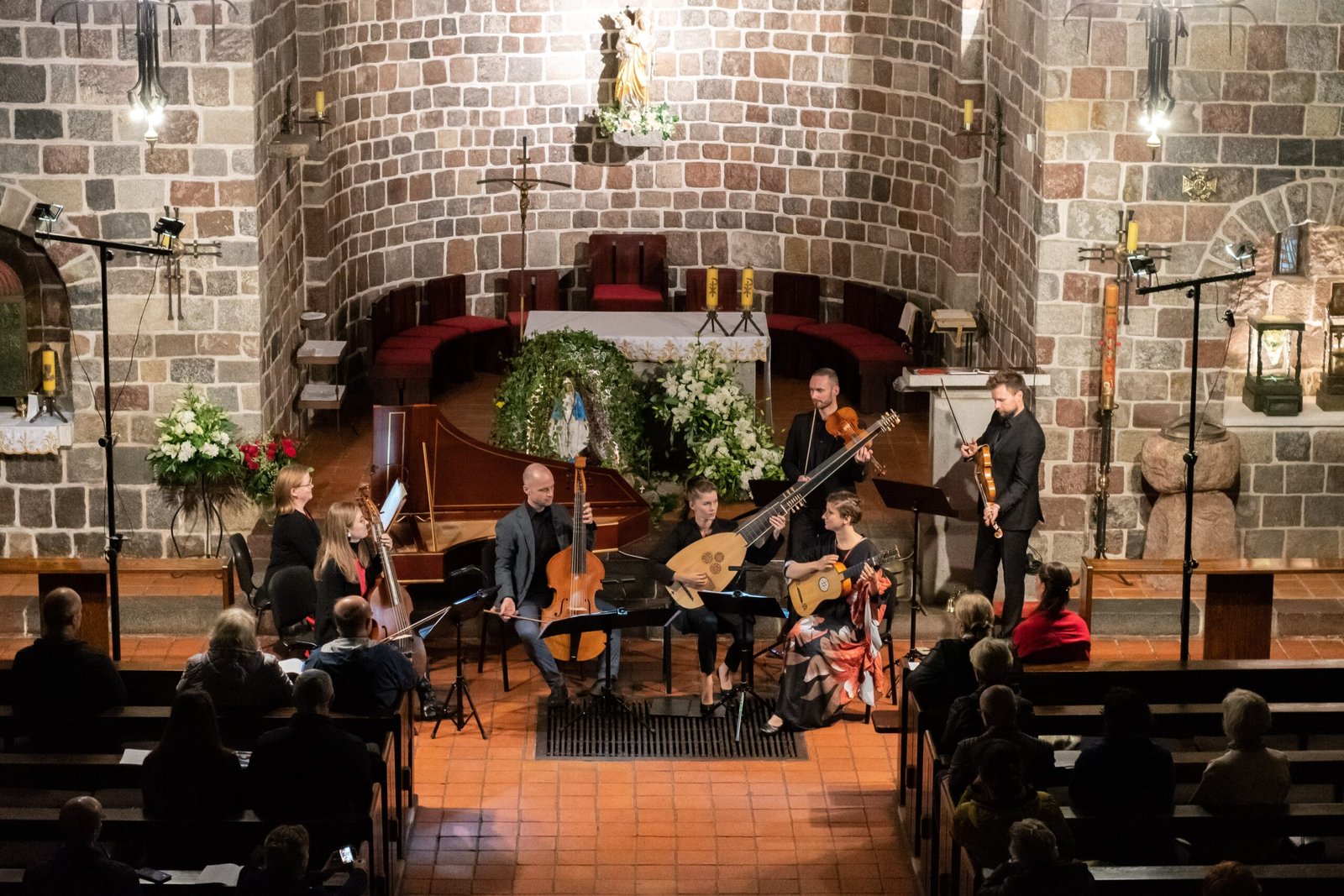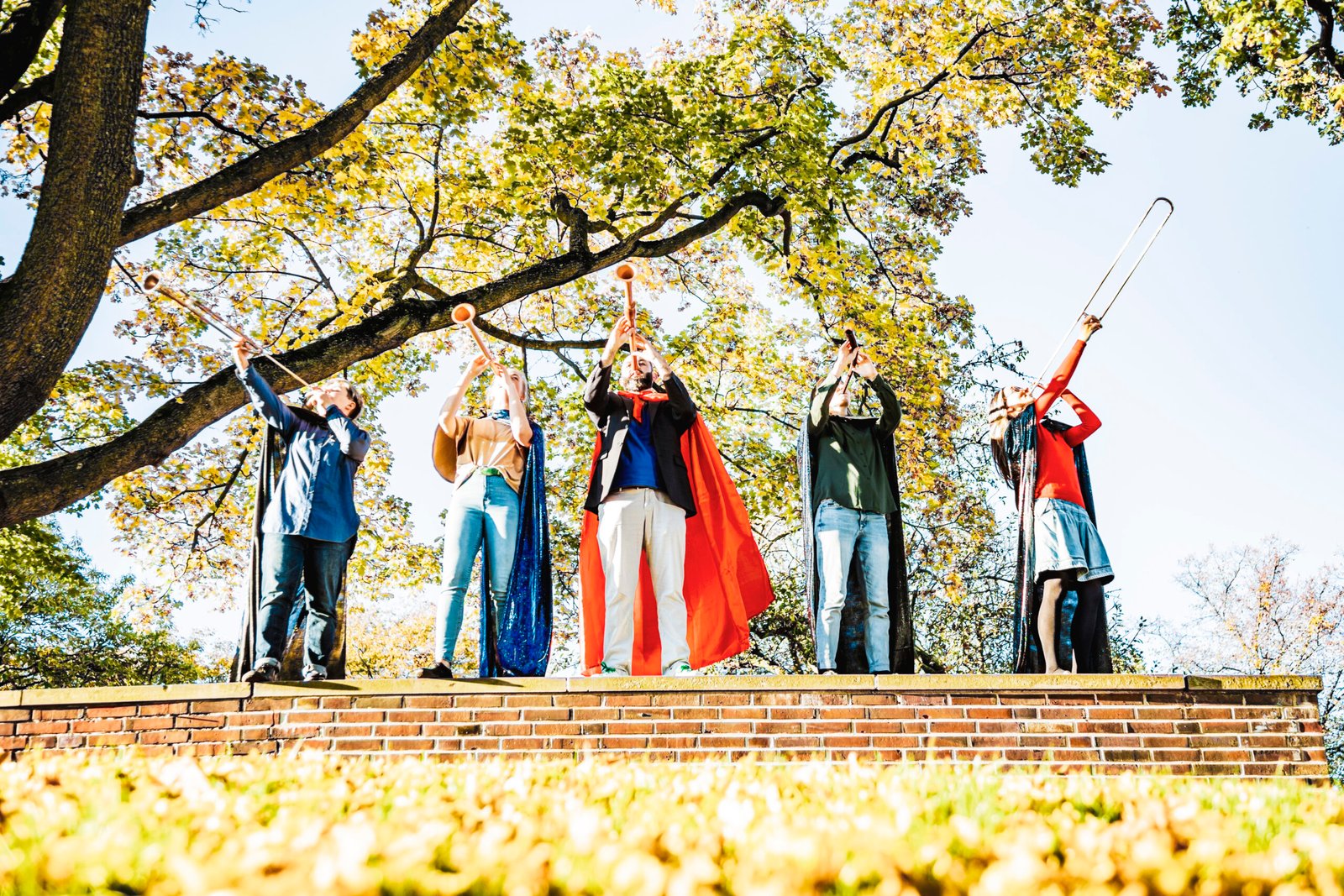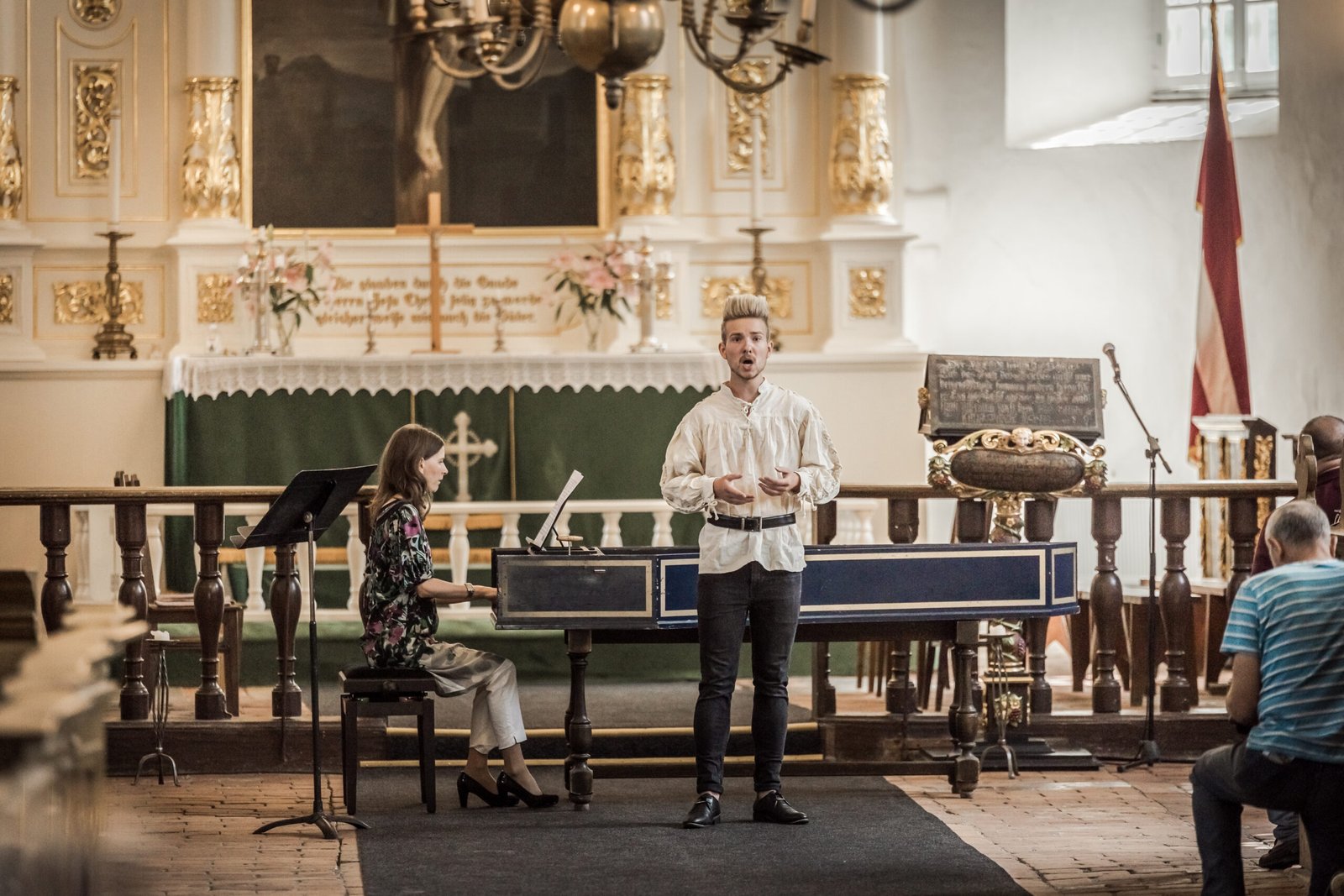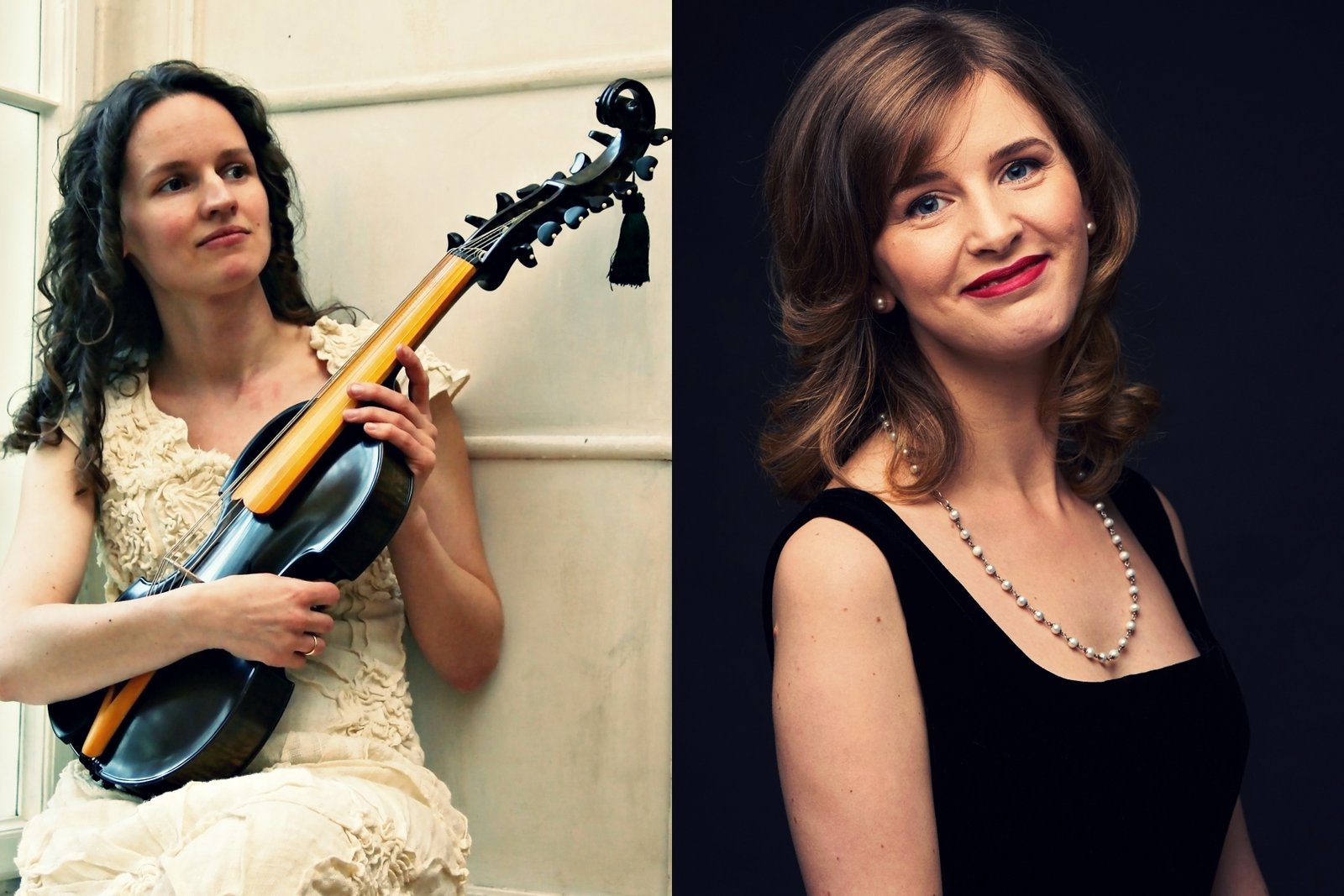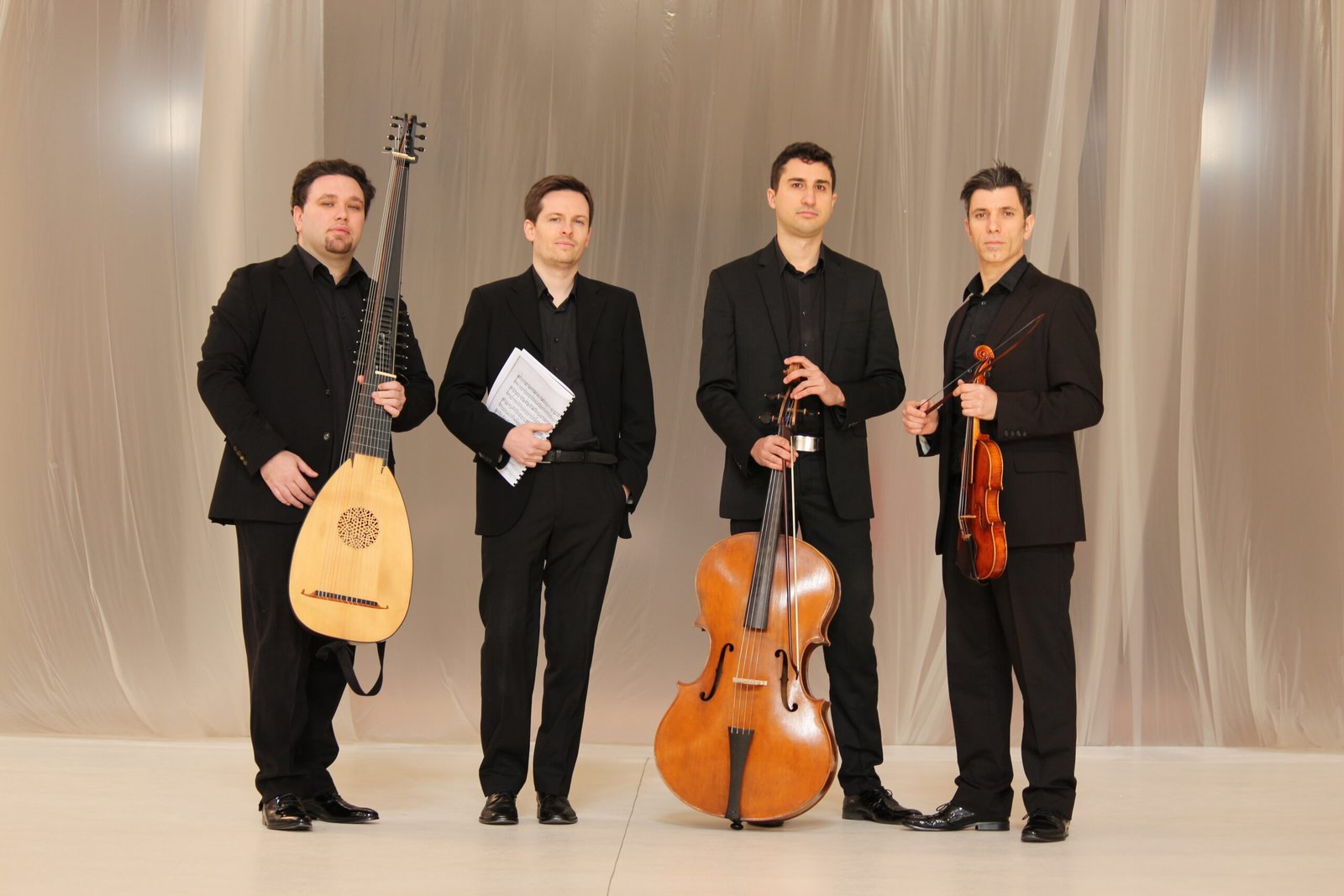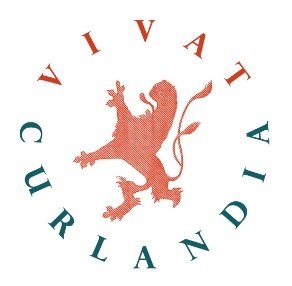PROGRAM 2023
VIII Early Music Festival
“VIVAT CURLANDIA!”
15th and 16th of July | BAUSKA, Latvia
10 early music events over the course of 2 days
15 July 12.00 – 13.00 | Bauska Cultural Centre
CONCERT FOR CHILDREN
SENIE MŪZIKAS INSTRUMENTI
In order to create a special atmosphere, the hall of the Bauska Cultural Centre will be illuminated exclusively by candlelight, which will be taken care of by scenographer Artūrs Arnis. After the children’s concert, you will have the opportunity to take a photo with the artists dressed in period costumes, look at their musical instruments and ask a questions that might interest you.
15 July 14.00 – 15.10 | Bauska Castle
FESTIVAL’S OPENING CONCERT
MUSIC FOR A WHILE
Melodies from the British Isles
Some highlights of baroque music had their origin in the British Isles. Starting with Henry Purcell, who was already called the “Orpheus britannicus” during his lifetime and was considered the greatest English composer, to Georg Friedrich Händel, who achieved fame and glory in London through his most successful creative period as an opera composer.
“In this program we want to show excerpts from the colorful musical life in England. Here you will find famous English folk songs as well as rousing opera arias, which we will present in chamber music versions.”
This concert will be made more special by an important event: for less than a year – since November 2022 – Bauska Castle has acquired an excellent and specially commissioned musical instrument – a double virginal. It is modeled after the instrument created by the Flemish master Jan Ruckers in 1623. The original is preserved in the Museum of the Land of Württemberg in Stuttgart. An authentic copy of the instrument for the Bauska Castle Museum was made by the world-famous master Christian Fuchs from Frankfurt, Germany. Festival’s “VIVAT CURLANDIA!” opening concert “Music for a while. Melodies from the British Isles” will be one of the first occasions that this unique musical instrument will be heard by a wider audience.
Early music ensemble DUO DOLCEMENTE (Germany):
Sophia Schambeck (recorders)
Alexander von Heißen (double virginal)
15 July 16.00 – 17.10 | Bauska Castle
CONCERT
ALTA VIA
17th-century Polish Instrumental Music
In the late 16th and in the first half of the 17th century, Polish music was flourishing exceptionally, which was partially caused by the necessity of meeting the needs and requirements of two passionated about music Kings: Sigismund III Vasa (reign 1587-1632) and his successor, Władysław IV Vasa (reign 1632-1648). During that period, cultural contacts with Italy, which were started a few decades before thanks to Queen Bona Sforza, became much closer. The efforts and generosity of Sigismund III allowed to bring from Rome over a dozen fine musicians, who became part of The Royal Band. The concert “Alta Via. 17th-century Polish Instrumental Music” performed by the Polish early music ensemble INTEMPERATA will feature music by composers such as Adam Jarzębski, Stanisław Sylwester Szarzyński, Marcin Mielczewski and others.
Early music ensemble INTEMPERATA (Poland):
Michał Marcinkowski, Marcin Tarnawski (baroque violins)
Ewa Witczak, Matthias Bergmann (viola da gamba)
Maria Wilgos, Klaudyna Żołnierek (therbo/baroque guitar)
Dorota Zimna (harpsichord/organ)
15 July 18.00 – 19.10 | Bauska Castle
CONCERT
VIDUSLAIKU MŪZIKA TRISTANAM UN IZOLDEI
“The Harp, the Philtre and the Sword: Medieval Music for Tristan and Iseult:
Coming from a Celtic legend, the story of Tristan and Iseult achieved great success during the Middle Ages.
Around 1170, the poets Béroul and Thomas of England wrote the first written sources of the story. This myth about desire and passion also inspired several musicians long before Wagner’s famous opera. Based on anonymous lais from the Vienna manuscript (XIIIth century) of the Prose Tristan, this programme also gives the chance to discover some instrumental pieces from the London manuscript and other gems by Senleches and Jacopo da Bologna. It immerses us in a fascinating world of inspiration and reveals the richness and diversity of medieval music.
Awarded several times since its creation in 2016, ApotropaïK Ensemble explores repertoires from the XIIth to the XVth centuries, from the first troubadour songs to the birth of Renaissance music. Working on a solid research base, the ensemble aims to renew the approach of medieval music with a sensible and modern point of view. The ensemble is a member of the large scale European residency project EEEMERGING+ and at festival “Vivat Curlandia!” will implement a residency during which the culmination of the concert “The Harp, the Philtre and the Sword: Medieval Music for Tristan and Iseult” will take place.
Medieval music ensemble APOTROPAÏK (France):
Clémence Niclas (voice/flute)
Marie-Domitille Murez (gothic harp)
Louise Bouedo-Mallet (bow fiddle)
Clément Stagnol (medieval lute)
15 July 19.30 – 22.00 | Bauska Cultural Centre
OPERA BY CANDLELIGHT
JEAN-BAPTISTE LULLY OPERA ACIS ET GALATEE (1686)
An opera in 2 acts with an intermission
On the evening of July 15, the Bauska cultural center will become a place where you can musically travel more than 300 years into the past. When the doors of the hall open, the audience’s senses will become more sensitive, because the dark hall will be illuminated only by candlelight. This will allow the gorgeous period costumes to acquire the warm colors only characteristic of candlelight, creating a play of shadows.
In addition, historical musical instruments and the voices of singers will take care of the sonic enjoyment, conjuring the mood of the theater of the second half of the 17th century. For the first time in the history of the “Vivat Curlandia” festival, an opera belonging to the French court culture will be performed – the opera “Acis et Galatee” by Jean-Baptiste Lulli, which the composer dedicated to the Grand Dauphin, or the son of the King of France, also called the Sun King, Louis XIV. The opera or pastorale-héroïque was first performed in 1686 and was part of the opera repertoire in Paris until 1762. The opera tells the story of a love triangle between the mortal shepherd Acis, the immortal sea nymph Galatee and the terrifying Cyclops-the giant Polyphemus, while the composer Lully himself was the most famous and important composer of his time, without whose contribution the world of music and dance would have taken completely different twists and turns.
Cast:
Baroque opera company COLLEGIUM MUSICUM RIGA
Soloists: Ieva Sumeja, Rūdis Cebulis, Monta Martinsone, Arūnas Maliukas, Artis Muižnieks, Krišs Pozemkovskis, Karolina Parmas
Baroque choir Collegium Choro Musici Riga
Baroque orchestra Collegium Musicum Riga
Conductor and artistic leader Māris Kupčs
Director: Dārta Nora Pauļuka-Sadlovska, consultant: Renna Shcherbakova
Stage director: Artūrs Arnis
Costume designers: Jeļena Forste and Elīna Kuzņecova (“Mazā muiža”)
15 July 23.00 – 00.10 | Bauska Castle’s courtyard
NIGHT CONCERT BY CANDLELIGHT
1561. GADS TUMSAS AIZSEGĀ
“1561 by night”
When the Bauska Castle was still young, around a hundred years old, it became part of Courland and Semigallia. The first duke to rule from the castle, Gotthard Kettler (1517-1587), had come a long way from far west, Westphalia, which is western Germany today. He and his suite were used to celebrating important events such as weddings, coronations and anniversaries in a certain way and always with good music. In keeping with the taste and spirit of the times, various wind and string instruments were sounded to provide a variety of sound colours to entertain the festive society and honour noble guests.
Today we can reconstruct these traditions based on the written records of significant events. [hansey]Pfeyfferey is an ensemble dedicated to the music of the 15th and 16th centuries: we use historical knowledge to offer a colourful mix of polyphonic chansons, motets and dance music to today’s audience. Tonight’s program can be called a playlist of the year 1561. Some pieces are brand-new and experimental at the time, like works by Orlando di Lasso. Some are composed by already established and famous composers, like the deceased Josquin des Prés and Ludwig Senfl.
Musicians at the time travelled with their employers – the nobility, bringing instruments and repertoire to new places. Another unique feature of tonight’s programme is an excellent example of this musical mobility and connection between Central and Eastern/Northern Europe. [hansey]Pfeyfferey presents newly reconstructed dance music compiled and published by the town musician-brothers Bartholomäus and Paul Hess in Wroclaw, Poland, in 1555.
Join [hansey]Pfeyfferey on a festive night in 1561, feel the atmosphere of the centuries past, and who knows, together we might experience the ghosts of the grand Bauska Castle joining us in this celebration.
Renaissance music ensemble ENSEMBLE [HANSE]PFEYFFEREY (Germany):
Alexandra Mikheeva (slide trumpet/trombone)
Laura Dümpelmann (shawn)
Lilli Pätzold (cornetto)
Teresa Ortner (shawn/dulcian)
Aljoša Šolak (tenor violin)
Dávid Budai (bass violin)
16 July 11.30 – 12.30 | Bauska Church of the Holy Spirit
CONCERT
JAUNO TALANTU KONCERTS
Early Music Festival VIVAT CURLANDIA! invites you to listen to the traditional event of the festival – the “Jauno talantu koncerts”, getting to know the young professionals of early music and learning about the richness and diversity of music from past centuries.
Musicians:
Students of Early Music Department of Jāzeps Vītols Latvian Academy of Music
More information about the department and possibilities to study early music in Latvia read here
16 July 15.00 – 16.10 | Bauska Castle’s tower
CONCERT
IL SUONAR D’AFFETTO
Musicians:
Gian Andrea Guerra (baroque violin, Italy)
Mauro Pinciaroli (lute, Italy)
16 July 17.00 – 18.10 | Bauska Castle
CONCERT
GRACIOZĀS GALMA STĪGAS
Viola d’amore (literally – violin of love) is a relatively rare and mysterious instrument with 6 to 7 playing strings and most often with the same number of resonating strings. It is the co-vibration of the additional strings with the played strings that creates the soft sound, which could be the reason for the instrument’s name – d’amore.
Viola d’amore was most loved in the courts, where its soft sound could fill the hall. In the “Graceful Court Strings” concert, we will hear it together with the harpsichord – an equally beloved and soft-sounding string keyboard instrument in the courts.
The music of the Czech virtuoso and head of the city of Tabor, Jan Krumlovský, will be played, which was composed during his short stay at the Dresden court. Hofmusikdirektor, or head of court music in Dessau, Friedrich Wilhelm Rust’s sonatine “La Paisanne” will delight with the lively rhythms of peasant music. Johann Sebastian Bach’s sonata in B major will also perfectly complement the mood, as it was composed during the time when the composer served at the court of Prince Leopold. The sonata was originally composed for another court favorite instrument – the viola da gamba, but in this concert it will experience a completely new performance – an arrangement for the viola d’amore. It was written by Daniel Thomason, longtime president of the Viola d’amore Society of America, and was his last work before his passing in 2020. The sheet music was mailed by Daniel Thomason to the viola d’amore soloist of this concert. It should be noted that the viola d’amore was a familiar instrument also to Bach, his “John’s Passion” has an aria accompanied by even two violas d’amore.
Viola d’amore was probably known in the Duchy of Courland as well. In any case, as recently revealed, it is known for certain that the mysterious instrument – the violin of love or viola d’amore – was owned by the first rich Latvian businessman Jānis Šteinhauers (1705–1777). He supplied timber for the construction of the residence of the Duke of Courland, Ernst Johann von Biron, in Rundāle (1736–1740), bypassing the rules of the Riga City Council, which forbade the descendants of the natives to engage in trade. He certainly has unappreciated merits in the defense of Latvian national interests.
Musicians:
Karlīna Īvāne (viola d’amore)
Gertruda Jerjomenko (harpsichord)
16 July 19.00 – 20.10 | Bauska Castle
CLOSING CONCERT
NEAPOLE UN EIROPA
Italian ensemble Quartetto Vanvitelli returns to Latvia and “VIVAT CURLANDIA!” festival with a thrilling concert “Napoli e l’Europa”!
The Neapolitan school of instrumental music and its links with the rest of Europe in the eighteenth century – this is at the heart of Quartetto Vanvitelli’s activities. After concentrating on the work of the composer Michele Mascitti of Abruzzo, an outstanding figure representing Italian music in France, the quartet now turns to a composer-violinist from Sardinia, Giuseppe (Joseph) Agus (1722-1798), who achieved success in London and Paris in the second half of the 18th century. Like Mascitti, he studied in Naples, then lived in London from the late 1740s, coming into direct contact with the most important protagonists of 18th-century English music: George Frederic Handel, Thomas Arne, Johann Christian Bach.
Working as a violinist in the theatres and concert halls of the English capital, Agus published various instrumental collections and participated in collective works with music by Handel, Arne and Hasse. Even though his artistry was appreciated in London, Agus moved to Paris in the 1770s, where he published a few compositions and taught at the Conservatoire until his death in 1798.
Early music ensemble QUARTETTO VANVITELLI (Italy):
Gian Andrea Guerra (baroque violin)
Nicola Brovelli (baroque cello)
Mauro Pinciaroli (lute)
Luigi Accardo (harpsichord/organ)
LOCATIONS OF THE EVENTS
Bauska Castle (Bauskas pils): Pilskalns, Bauska, LV-3901, Latvija;
Bauska Cultural Centre (Bauskas kultūras centrs): Kalna iela 18, Bauska, LV-3901, Latvija;
Bauska Church of the Holy Spirit (Bauskas Sv. Gara baznīca): Plūdoņa iela 13A, Bauska, LV-3901, Latvija.
Have any questions? Please don’t hesitate to contact us: info@earlymusic.lv or +371 25714770.
Follow & share:
Please be informaed that photography, video and/or audio recording may be made by the organizer during the events for illustrative artistic purposes and in order to inform the public about the event. These activities are made in accordance with the data processing requirements, without identifying specific persons. The obtained materials can be published and/or broadcast in the media, as well as on social networks on the Internet, etc.



